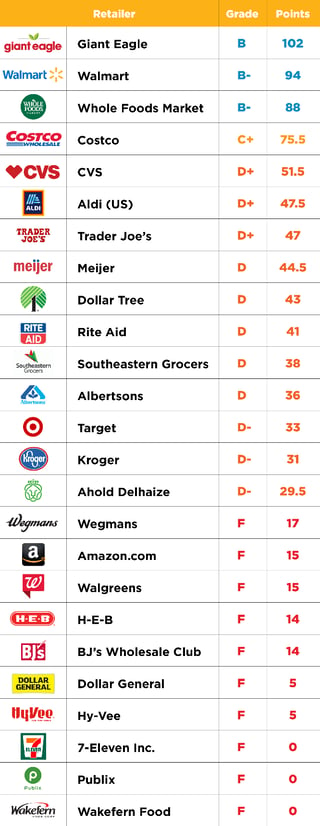Retailers Fall Short in Efforts to Protect Bees, Biodiversity
According to advocacy group Friends of the Earth’s latest Bee-Friendly Retailer Scorecard, which ranks 25 of the largest U.S. food retailers on pesticides and pollinator protection in their food and beverage supply chains, action falls far short of what’s needed to protect bees and other biodiversity from toxic pesticides, despite important momentum across the sector.
That momentum is represented by the addition of two companies, CVS and Southeastern Grocers, to the scorecard. Both retailers introduced new policies this year that encourage suppliers to eliminate or reduce the use of key toxic pesticides that harm pollinators and other beneficial insects that are critical to food security — neonicotinoids, organophosphates and glyphosate. This makes 12 companies in total since 2018, half of those graded on the scorecard.
However, Giant Eagle was the only major U.S. food retailer to make a timebound commitment to jettison key pesticides of concern in part of its supply chain. The company will eliminate the use of nitroguanidine neonicotinoids — banned in the European Union since 2018 but still allowed in the United States — from its produce supply chain by 2025.
“Grocery stores will feel the sting of widespread pesticide use in their supply chains if they don’t take action immediately,” noted Kendra Klein, senior scientist at Washington, D.C.-based Friends of the Earth. “From the decimation of pollinator populations to the devastation of soil life, reducing pesticide use is a key solution to the biodiversity and climate crises that threaten our food supply. We call on food retailers to lead the way.”
The scorecard also features evaluations based on organic offerings, as research has shown that organic farming can help reverse pollinator declines and support up to 50% more pollinating species than conventional agriculture. Just two companies, Whole Foods Market and Trader Joe’s, met Friends of the Earth’s request to expand organic offerings to 15% of overall sales by 2025.
Without pollinators, grocery stores would run short of many fruits and vegetables, nuts, beans and items like chocolate and coffee, and, because bees pollinate alfalfa and other feed crops eaten by cows, even the dairy and meat supplies would decline. Research indicates that pollinator loss has already led to the lower production of crops such as apples and cherries.
While agriculture accounts for most pesticide use, the scorecard also awarded points to 12 companies for complementary policies in their home and garden supply chains, including credit to Dollar Tree for ending sales of neonicotinoid and glyphosate products for outdoor use, joining six other companies that have already done so.
These retailer commitments follow a multiyear effort led by Friends of the Earth and its allies to end the use of toxic pesticides in the food system. The campaign is supported by more than 100 beekeeping, farming, farmworker, consumer and environmental organizations.
The first certified-organic national grocer, Austin, Texas-based Whole Foods has more than 500 stores in the United States, Canada and the United Kingdom. The company is a wholly owned subsidiary of Seattle-based Amazon, which is No. 2 on The PG 100, Progressive Grocer’s 2022 list of the top food and consumables retailers in North America, while Woonsocket, R.I.-based CVS Health, whose CVS Pharmacy subsidiary operates almost 10,000 locations nationwide, is No. 7; Monrovia, Calif.-based Trader Joe’s, with more than 500 stores in 40-plus states, is No. 27; Chesapeake, Va.-based Dollar Tree, operating 16,231 stores under the Dollar Tree, Family Dollar and Dollar Tree Canada banners across 48 states and five Canadian provinces, is No. 29; Pittsburgh-based Giant Eagle, with more than 470 stores throughout western Pennsylvania, Ohio, northern West Virginia, Maryland and Indiana, is No. 36; and Jacksonville, Fla.-based Southeastern Grocers, whose banners include Fresco y Más, Harveys Supermarket, and Winn-Dixie grocery stores, is No. 39.











